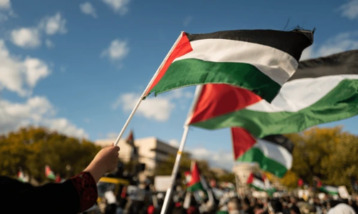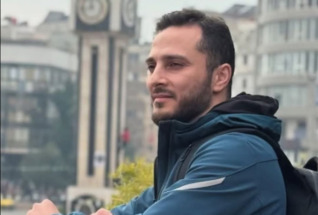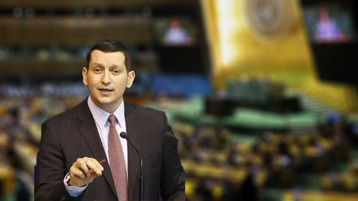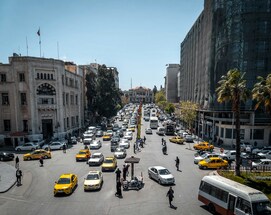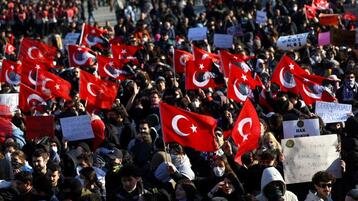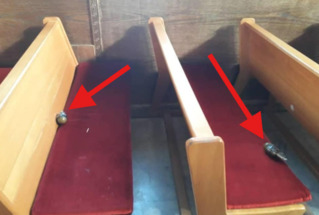-
Egypt calls Erdogan statements ‘ironic,’ accuses Turkey of sponsoring terrorism
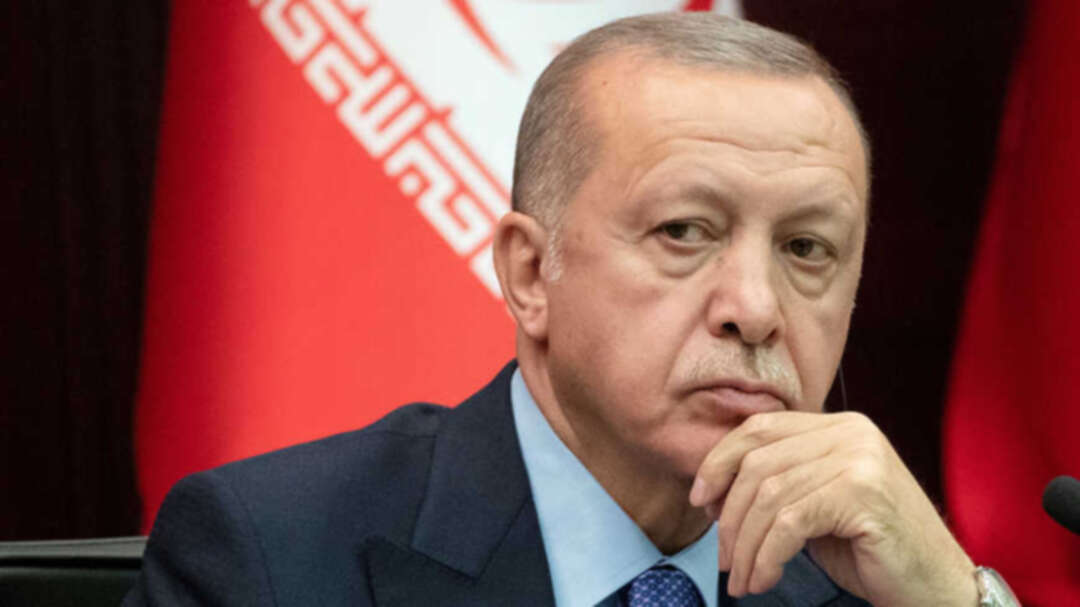
Egypt’s foreign ministry spokesman, Ahmed Hafez, slammed Turkish President Recep Tayyip Erdogan’s statements at the UN General Assembly this week where he urged the UN to “handle the suspicious death of Morsi,” referring to the deceased former president of Egypt, and member of the Muslim Brotherhood.
In an official statement, Egypt’s foreign ministry spokesman, Ahmed Hafez, said that Erdogan “claimed to defend the values of justice in his speech, but at the core showed feelings of hatred and spite toward Egypt and its people who have nothing but appreciation for the people of Turkey.”
Hafez added that it was “ironic” for Erdogan to make these allegations “in light of his sponsorship of terrorism in the region due to his regime’s flagrant violations against the friendly Turkish people where he tries to hold them hostage to a fake freedom and alleged justice.”
He went on to list ongoing human rights violations in Turkey under Erdogan’s leadership, including the thousands of political prisoners, the suspicious deaths of dozens of prisoners due to torture or inhuman prison conditions, and the closure of thousands of universities and educational institutions.
Erdogan had blamed Morsi’s death on current President Abdel Fattah al-Sisi, stating that “Sisi is a tyrant, not a democrat.”
“They didn’t make the slightest intervention as the country’s first democratically elected president suffered for more than 20 minutes. They didn’t deliver his remains to his family or let him be buried in his hometown per his will,” Erdogan said on Sunday during a gathering in New York with heads of Muslim organizations in the US.
The gathering was sponsored by the Turkish American National Steering Committee (TASC), whose co-chairperson is Erdogan’s cousin. In 2016, TASC officials were questioned by US authorities on suspicion of involvement in political espionage on behalf of the Turkish government.
Former Egyptian President Mohamed Morsi died in a hospital in June after fainting during a court hearing.
The public prosecutor said he had collapsed in a defendants’ cage in the courtroom shortly after speaking, and had been pronounced dead in hospital at 4:50 p.m. (1450 GMT).
Morsi’s family attended funeral prayers a day after his death in the mosque of Tora prison, then buried him in Cairo’s western district of Nasr City.
In the statement, Hafez said that the Turkish president’s “malicious practices are apparent after he embraced the terrorist Brotherhood organization and its elements in Turkey, and provided them with political support and media platforms for its terrorist elements to continue to promote their subversive ideas in Egypt and the Region.”
He added that Erdogan’s statements on Egypt are a “desperate attempt for him to steer attention away from his deteriorating regime and the successive losses he is suffering on the party level, the Turkish scene, and the international arena.”
The Turkish leader had come under heavy fire after the country’s top election body annulled the results of the March 31 mayoral vote in Istanbul and ordered a re-run on June 23.
The original vote was narrowly won by the opposition candidate, dealing the ruling AKP party its first defeat in the city, which has been controlled by the AKP and its predecessors, for 25 years. But Erdogan alleged “serious corruption” in the count.
In his UNGA speech, Erdogan also compared Israel to Nazi Germany, referring to the “massacre in the Gaza Strip” and comparing it to the Holocaust.
You May Also Like
Popular Posts
Caricature
BENEFIT AGM approves 10%...
- March 27, 2025
BENEFIT, the Kingdom’s innovator and leading company in Fintech and electronic financial transactions service, held its Annual General Meeting (AGM) at the company’s headquarters in the Seef District.
During the meeting, shareholders approved all items listed on the agenda, including the ratification of the minutes of the previous AGM held on 26 March 2024. The session reviewed and approved the Board’s Annual Report on the company’s activities and financial performance for the fiscal year ended 31 December 2024, and the shareholders expressed their satisfaction with the company’s operational and financial results during the reporting period.
The meeting also reviewed the Independent External Auditor’s Report on the company’s consolidated financial statements for the year ended 31 December 2024. Subsequently, the shareholders approved the audited financial statements for the fiscal year. Based on the Board’s recommendation, the shareholders approved the distribution of a cash dividend equivalent to 10% of the paid-up share capital.
Furthermore, the shareholders endorsed the allocation of a total amount of BD 172,500 as remuneration to the members of the Board for the year ended 31 December 2024, subject to prior clearance by related authorities.
The extension of the current composition of the Board was approved, which includes ten members and one CBB observer, for a further six-month term, expiring in September 2025, pending no objection from the CBB.
The meeting reviewed and approved the Corporate Governance Report for 2024, which affirmed the company’s full compliance with the corporate governance directives issued by the CBB and other applicable regulatory frameworks. The AGM absolved the Board Members of liability for any of their actions during the year ending on 31st December 2024, in accordance with the Commercial Companies Law.
In alignment with regulatory requirements, the session approved the reappointment of Ernst & Young (EY) as the company’s External Auditors for the fiscal year 2025, covering both the parent company and its subsidiaries—Sinnad and Bahrain FinTech Bay. The Board was authorised to determine the external auditors’ professional fees, subject to approval from the CBB, and the meeting concluded with a discussion of any additional issues as per Article (207) of the Commercial Companies Law.
Speaking on the company’s performance, Mr. Mohamed Al Bastaki, Chairman BENEFIT , stated: “In terms of the financial results for 2024, I am pleased to say that the year gone by has also been proved to be a success in delivering tangible results. Growth rate for 2024 was 19 per cent. Revenue for the year was BD 17 M (US$ 45.3 Million) and net profit was 2 Million ($ 5.3 Million).
Mr. Al Bastaki also announced that the Board had formally adopted a new three-year strategic roadmap to commence in 2025. The strategy encompasses a phased international expansion, optimisation of internal operations, enhanced revenue diversification, long-term sustainability initiatives, and the advancement of innovation and digital transformation initiatives across all service lines.
“I extend my sincere appreciation to the CBB for its continued support of BENEFIT and its pivotal role in fostering a stable and progressive regulatory environment for the Kingdom’s banking and financial sector—an environment that has significantly reinforced Bahrain’s standing as a leading financial hub in the region,” said Mr. Al Bastaki. “I would also like to thank our partner banks and valued customers for their trust, and our shareholders for their ongoing encouragement. The achievements of 2024 set a strong precedent, and I am confident they will serve as a foundation for yet another successful and impactful year ahead.”
Chief Executive of BENEFIT; Mr. Abdulwahed AlJanahi commented, “The year 2024 represented another pivotal chapter in BENEFIT ’s evolution. We achieved substantial progress in advancing our digital strategy across multiple sectors, while reinforcing our long-term commitment to the development of Bahrain’s financial services and payments landscape. Throughout the year, we remained firmly aligned with our objective of delivering measurable value to our shareholders, strategic partners, and customers. At the same time, we continued to play an active role in enabling Bahrain’s digital economy by introducing innovative solutions and service enhancements that directly address market needs and future opportunities.”
Mr. AlJanahi affirmed that BENEFIT has successfully developed a robust and well-integrated payment network that connects individuals and businesses across Bahrain, accelerating the adoption of emerging technologies in the banking and financial services sector and reinforcing Bahrain’s position as a growing fintech hub, and added, “Our achievements of the past year reflect a long-term vision to establish a resilient electronic payment infrastructure that supports the Kingdom’s digital economy. Key developments in 2024 included the implementation of central authentication for open banking via BENEFIT Pay”
Mr. AlJanahi concluded by thanking the Board for its strategic direction, the company’s staff for their continued dedication, and the Central Bank of Bahrain, member banks, and shareholders for their valuable partnership and confidence in the company’s long-term vision.
opinion
Report
ads
Newsletter
Subscribe to our mailing list to get the new updates!

